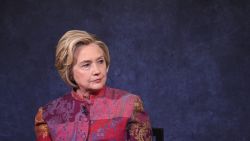Story highlights
Donald Trump could be the first landslide presidential loser in decades
Polls aren't looking good for the Republican nominee

It’s the political version of a 42-3 Super Bowl or a World Series sweep – an electoral landslide. And while there’s still a lot of game time left in 2016, Donald Trump’s poll numbers and his campaign hiccups have some political watchers wondering if this White House race could end up as the first landslide in a generation.
That’s a cruel irony for the Republican nominee, whose brand is “winning.” Yet national polls consistently show the Manhattan real estate tycoon far behind Democratic nominee Hillary Clinton, often by double digits.
More ominously for Trump, Clinton could pick off electoral votes in a series of Republican states. That’s a recipe for a Clinton win higher than twin victories each by the two most recent Democratic presidents, Barack Obama, who never cracked 53% of the vote, and her husband, Bill Clinton, who was twice elected despite never getting to 50%, thanks in part to Ross Perot.

Mitt Romney probably wasn’t too far off when he suggested about 47% of the population is going to vote one way or the other in any event. But Trump could seriously challenge that rule if the current polling holds. A George McGovern or Barry Goldwater-level wipeout is hard to imagine in this era of limited persuadable voters. But something less than a wipeout is not outside the realm of possibility if Trump can’t win all of the reliably Republican states in the South and West.
“At this point, a landslide is a real possibility,” said David B. Cohen, political science professor at the University of Akron. “The fact that reliably red states like Georgia, Arizona, and Utah are in play point toward a huge potential triumph for Hillary Clinton.”
Though he cautioned Democrats about getting too giddy over a potential Hillary Clinton win – of any size. More than 11 weeks out from Election Day the campaign remains highly fluid and could shift course at nearly any point.
“Of course, the political environment can change in a heartbeat and perhaps tomorrow something may occur that could be a great boon to the Trump campaign and change the dynamics of the race.”
The Trump campaign has not responded to a request for comment. And Trump’s Twitter feed, which once touted poll results on a daily basis, has gone largely silent on the topic since late July.
Recent polling in other recent high profile events has been spotty, though. Earlier this year a swath of public opinion surveys showed a majority of British voters would choose to keep their country in the European Union. But the “Leave” option won by 52% to 48%.
Yet even with plenty of time for the race to move in Trump’s direction, the GOP nominee potentially fits the profile of landslide losers, said Steven M. Gillon, history professor at the University of Oklahoma and biographer of Walter Mondale, the 1984 Democratic nominee who won only 13 Electoral College votes, to President Ronald Reagan’s 525.
Poll: Clinton holds wide lead in Virginia
“The common thread that runs through landslide elections in modern times is a candidate who misreads the public mood and finds himself alienated from the broad mass of middle-of-the-road voters who decide elections,” Gillon said.
Though Trump is in some ways a new breed, Gillon added.
“It’s not clear he has an ideology. He’s blinded by his ego and trapped by his arrogance. That is what makes him different.”
To be sure, it’s not all Donald Trump’s fault he’s behind by so much. Democrats already hold a significant electoral advantage. With 270 electoral votes needed to win the White House, Democrats from 1992 on have won states totaling 242. Republicans won only 102 consecutively over that time span. So any other Republican nominee – even a more conventional candidate like Texas Sen. Ted Cruz or Ohio Gov. John Kasich – would have started off with big challenges.
But Trump’s months of unforced errors, unorthodox style and Clinton’s tightly organized campaign efforts could make Trump the first nominee to lose by ten or more points since 1984. That year Mondale, a former vice president, wiped out against Reagan 59-41% in the popular vote.
Hillary Clinton’s high unfavorable numbers don’t preclude a lopsided result. Her trustworthiness issues – born out in polling – haven’t particularly helped her rivals. And the victors in some previous landslides have had likeability issues of their own.
“As may happen with Trump, losing to Clinton, McGovern and Goldwater went down to landslide defeats at the hands of candidates (Richard Nixon and LBJ) who were not particularly appealing as personalities,” said Bruce Miroff, politics professor at SUNY Albany and author of “The Liberals’ Moment: The McGovern Insurgency and the Identity Crisis of the Democratic Party.”
Polls looking tough for Trump
Polls, once a favorite Trump topic at his boisterous campaign rallies, are now a sore subject. A series of recent surveys show Trump falling short of Clinton nationally – and most importantly in key electoral states.
The most recent CNN Poll of Polls incorporating the results of six major polls – all conducted after the party conventions concluded in late July – found Clinton with an average of 49% support to Trump’s 39%. When third party candidates Gary Johnson and Jill Stein were included, the margin remained the same, with both candidates losing the same amount of support – 45% for Clinton to 35% for Trump, with Johnson at 9% and Stein at 5%.
And Clinton has opened up commanding leads over Trump in several critical battleground states, including North Carolina and Colorado. Clinton leads Trump 46%-32% in Colorado, 44%-39% in Florida, 48%-39% in North Carolina and 46%-33% in Virginia, according to recent NBC/Wall Street Journal/Marist polls.
Virginia is particularly problematic for the Trump campaign. The Old Dominion was once a bedrock of the GOP’s upper hand in the Electoral College, before Barack Obama won it in 2008 and 2012. A Washington Post poll released Tuesday shows Clinton beating Trump among registered voters there, 52% to 38%, and retaining her edge among likely voters, 51% to 43%. The survey found Clinton leading Trump in every geographic part of Virginia except the rural southwest, the state’s most reliably conservative corner.
That’s put even reliably Republican states into question. Trump acknowledged last week that his campaign is “having a tremendous problem in Utah,” where Mitt Romney won more than 70% of the vote in 2012.
“I don’t know a Trump supporter in Utah. And I know a lot of Republicans and I know a lot of conservatives,” said Robert Alan Goldberg, professor of history at the University of Utah and author of “Barry Goldwater.”
He said the Beehive State’s conservative tilt means it will likely back Trump in the fall – however reluctantly. But the notion that it’s even in play points to Trump’s electoral weakness, Goldberg said.
That’s led the usually uber-confident Trump to muse publicly about losing.
“I’ll just keep doing the same thing I’m doing right now,” he told CNBC last week. “And at the end it’s either going to work or I’m going to you know, I’m going to have a very, very nice, long vacation.”
Landslides didn’t used to be unusual
Recent decades have seen a series of strong victories by presidential candidates – George H.W. Bush winning 426 electoral votes in 1988, Bill Clinton’s 370 and 379 in 1992 and 1996, respectively, and Barack Obama’s 365 in 2008 followed by 332 four years later.
That’s a shift from the mid- and late-20th century, when landslides weren’t unusual.
President Franklin Delano Roosevelt, in 1936 running for re-election after years of leading the Depression-fighting New Deal, beat his GOP rival, Kansas Gov. Alf Landon 60.8% to 36.5%. That was good for a 523-8 Electoral College thumping of Landon, who nabbed only Maine and Vermont.
Another Democratic president, Lyndon Johnson, pulled off his party’s last true landslide victory. In 1964, LBJ successfully painted GOP opponent Barry Goldwater as trigger-happy and casually loose-lipped about the use of nuclear weapons, among other slams. Johnson won a record 61.1% of the popular vote, and a 486-52 Electoral College mandate.
Eight years later, Democrats were on the business end of an epic defeat. Against President Richard Nixon, Democratic standard-bearer George McGovern won only Massachusetts and the District of Columbia, making for an utterly one-sided 520-17 Electoral College loss, on a 60.7-37.5% popular vote edge.
Similarities to Trump
Looking at Donald Trump’s chances in 2016, Nicole Hemmer, at the University of Virginia’s Miller Center, said the Goldwater and McGovern examples are most relevant.
“Both men were nominated after contentious [primary] campaigns, in years that their parties were badly split along ideological lines,” she said.
“Goldwater represented the conservative wing of his party and lacked the support of moderate and liberal Republicans,” she added. “While the divisions are different this year, the sight of Ted Cruz being booed down at the Republican National Convention was eerily reminiscent of moderate Republican Nelson Rockefeller getting shouted down in his anti-Goldwater speech at the 1964 convention. And a number of high-profile Republicans like George Romney, Jacob Javits, and Rockefeller gave only tepid support, or withheld their support altogether.”
Goldberg, the Goldwater biographer, said Trump’s personality traits look familiar. There’s his recent spat with the family of a slain Muslim soldier, after they knocked his immigration proposals during the Democratic convention. In 1964 Goldwater hurt his own chances by suggesting that tactical nuclear weapons should be treated more like conventional weapons and should be used in Vietnam. That statement – of profound geopolitical importance – was triggered by a personal pique with Defense Secretary Robert McNamara, Goldberg said.
Bruce Miroff, the George McGovern biographer, said that like Trump today, the staunchly liberal senator from South Dakota in 1972 “drew a fervent base of devoted and excited followers, but these followers fell well short of constituting a potential electoral majority.”
Geographic Sorting
That election, and similar landslide results, played out when large swaths of voters were willing to cross party lines. That doesn’t happen much any more.
“Politics has changed so dramatically. We’re highly polarized. We get these situations where more than 90% of Democrats vote for the Democrat, and 90% of Republicans vote for the Republican,” said Peter Fenn, a veteran Democratic consultant.
“Forty-nine states is tricky. So on that level it’s hard to conceive of a huge of a landslide,” said Fenn, who in 1964 was a 17-year-old page at the Democratic convention in Atlantic City, New Jersey, which nominated LBJ.
“But you have a candidacy unlike we’ve ever seen in modern American history,” Fenn said. “Trump is by-and-large unacceptable to an awful lot of people, and I think is likely to become even more unacceptable.”


















